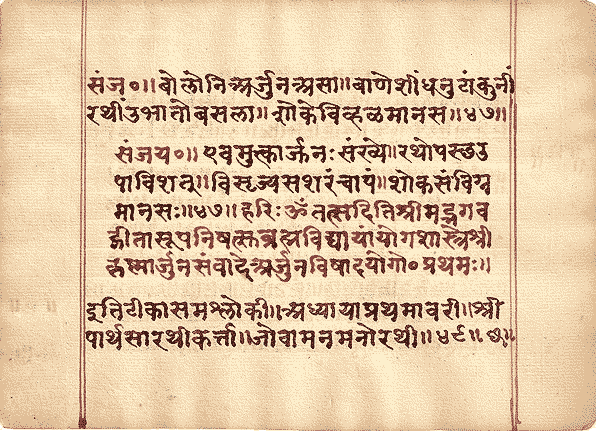
evam uktvārjunaḥ saṃkhye rathopastha upāviśat
visṛjya saśaraṃ cāpaṃ śoka-saṃvigna-mānasaḥ
Update RequiredTo play the media you will need to either update your browser to a recent version or update your Flash plugin.
saṁkhye (in battle) śoka-saṁvigna-mānasaḥ (one whose mind is afflicted with grief) arjunaḥ (Arjuna) evam (thus) uktvā (after speaking),
sa-śaraṁ cāpaṁ (a bow with arrows) visṛjya (after casting aside),
rathopasthe (on the seat of the chariot) upāviśat (he sat down).
| evam |
– |
av. – thus; |
| uktvā |
– |
√vac (to speak) absol. – after speaking; |
| arjunaḥ |
– |
arjuna 1n.1 m. – white, clear, Arjuna; |
| saṁkhye |
– |
saṁkhya 7n.1 n. – in battle (from: sam-√khyā – to count, saṁkhya – counting, conflict); |
| rathopasthe |
– |
ratha-upastha 7n.1 m. – rathasyoparīti – on the seat of the chariot (from: ratha – chariot; upa-√sthā – to stand near; upastha – that which is under); |
| upāviśat |
– |
upa-ā-√viś (to enter, to sit down) Imperf. P 1v.1 – he sat down; |
| visṛjya |
– |
vi-√sṛj (to let go, to throw off) absol. – after casting aside; |
| sa-śaram |
– |
sa-śara 2n.1 m.; BV: yaḥ śaraiḥ sahāsti saḥ – which is with arrows (from: sa – together with, in common, short form of: saha or sama; occurs mostly in compounds, requires instrumental; śara – arrow); |
| cāpam |
– |
cāpa 2n.1 m. – a bow; |
| śoka-saṁvigna-mānasaḥ |
– |
śoka-saṁvigna-mānasa 1n.1 m.; BV: yasya mānasaṁ śokena saṁvignam asti saḥ – one whose mind is afflicted with grief (from: √śuc – to grieve, to burn, śoka – grief, despair, heat; sam-√vij – to tremble, to fear, to frighten, PP saṁvigna – agitated, terrified; √man – to think, manas – the mind, mānasa – pertaining to the mind, imagine, thought, the mind); |
In some editions before the verse there is:
saṁjaya uvāca (Saṁjaya spoke);
rathopastha → rathopastham (on the seat of the chariot);
visṛjya → utsṛjya (after letting go);
no commentary up to the verse BhG 2.10
sarvathāhaṃ na yotsyāmīty uktvā bandhu-viśleṣa-janita-śoka-saṃvigna-mānasaḥ pārthaḥ sa-śaraṃ cāpaṃ visṛjya rathopastha upāviśat
no commentary up to the verse BhG 2.11
tataḥ kiṃ vṛttam ity apekṣāyāṃ sañjaya uvāca evam uktvety ādi | saṅkhye saṅgrāme rathopasthe rathasyopari upāviśat upaviveśa | śokena saṃvignaṃ prakampitaṃ mānasaṃ cittaṃ yasya saḥ
saṅkhye saṅgrāme | rathopasthe rathopari |
iti sārārtha-varṣiṇyāṃ harṣiṇyāṃ bhakta-cetasām |
gītāsu prathamo ‚dhyāyaḥ saṅgataḥ saṅgataḥ satām
tataḥ kim abhūd ity apekṣāyāṃ sañjaya uvāca evam utveti | saṅkhye yuddhe rathopasthe rathopari upāviśat upaviveśa | pūrvaṃ yuddhāya pratiyoddhṛ-vilokanāya cotthitaḥ san ||
ahiṃsrasyātma-jijñāsā dayārdrasyopajāyate |
tad viruddhasya naiveti prathamād upadhāritam

